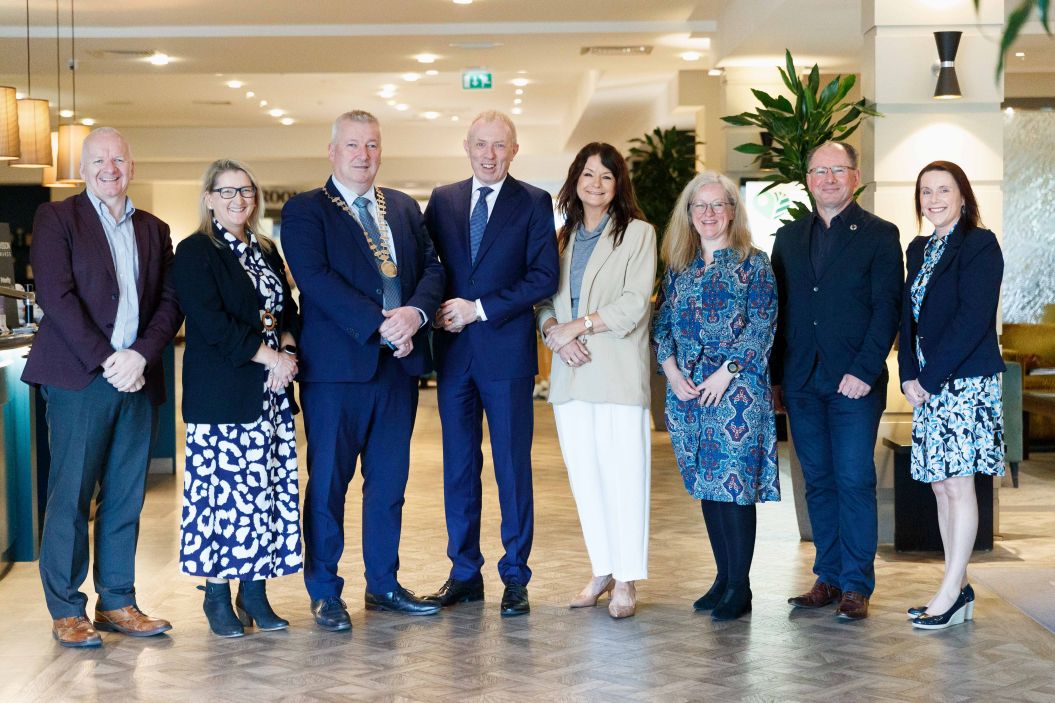
Speed is of the essence in developing a floating offshore wind sector…Ireland is 5+ years behind and falling behind by the day…Mid-West seminar hears
Minister of State Timmy Dooley with Sean Lenihan, chair of Engineers Ireland, Thomond Region; Helen Downes, CEO, Shannon Chamber; and keynote speakers at the offshore wind energy seminar held in the Radisson Blu Hotel, Limerick (from left): Barry O’Sullivan, Úna Brosnan, Alice Whittaker, Barry Gavin, chair of Shannon Chamber’s Mid-West Sustainability Network, and Sheila Downes. Photography by Eamon Ward.
The messages delivered by the panel of speakers at a recent offshore wind seminar organised jointly by Shannon Chamber and Engineers Ireland Thomond Region were enlightening and startling in equal measure, with a clear message that speed is of the essence and, given that Ireland is at least five years behind in developing the sector, the time to act is now.
Leading experts and practitioners from Ireland and the UK assembled at the Radisson Blu Hotel in Limerick to provide insights and strategies on harnessing the power of offshore wind, focusing on the crucial intersection of energy policy, economic development, and technological advancement.
Delivering the keynote address, Timmy Dooley TD, Minister of State at the Department of Agriculture, Food and the Marine and the Department of the Environment, Climate and Communications said that, despite the quantum of money and the scale of activity needed to deploy the development of the offshore wind sector, the dial needs to be moved on the work currently underway.
Commenting on the many interactions he has had with key stakeholders involved in the maritime industry, he said that he is impressed by how representatives from all sectors are proactively engaging to help deliver climate action and are assisting the growth of offshore wind opportunities.
“All are keen to maintain a successful maritime economy centred on our communities while also ensuring that we remain committed to underpinning the protection of our marine environment.
“Co-existence is important,” he added.
Emphasising that floating offshore wind is vital, not only for meeting our energy targets but for providing a reliable, clean and abundant source of power, he said that the benefits go well beyond the environmental benefits through bringing substantial economic opportunities to local coastal communities, creating jobs, boosting local industry, and revitalising ports and infrastructure .
“We must start looking beyond the 2030, 2040 or 2050 targets. We need to be looking at the benefits that will accrue in one hundred years’ time. Future generations will thank us in the way they have thanked us for past sterling projects such as Ardnacrusha and Shannon Airport,” he said.
Stating that the best way to deploy offshore wind is via a plan-led approach that allows for evidence, engagement and good governance to lead the way within a well-managed maritime area, he said that a memo, setting out the next phase approach for Designated Maritime Area Plans (DMAPs), is being presented to Government with proposals setting out the scope for the next phase of DMAPs to follow.
“We do need to move quickly and give certainty to the industry and potential investors. In presenting a plan, we will be giving a signal to the market that we will be moving quickly. We will be showing the kind of ambition that is there to benefit not just the Mid-West region but the entire country.
The panel of speakers at the seminar included Úna Brosnan, founder and director of Innovative Climate Solutions, a UK-based specialised climate consultancy with development experience dedicated to accelerating the growth of offshore wind markets. With twenty-three years of industry experience, fifteen of which have been dedicated to pioneering offshore wind, both fixed and floating wind projects, at supply chain, policy and stakeholder engagement levels, her insights on the day were impactful.
Her key message on the day was that partnership between Government and industry is essential and that, with competition in many countries, particularly Korea and Japan, Ireland needs to get investor interest back for the sector to be successfully deployed.
Chairman of the Shannon Estuary Economic Taskforce and an exponent of floating offshore wind as a game changer for Ireland’s future, Barry O’Sullivan was vociferous in his call for Government action to capitalise on the advantage floating offshore wind can offer the nation.
Environment and climate group lead at Philip Lee LLP, Alice Whittaker, ranked “Band 1” by Chambers Europe, and “Hall of Fame” by Legal 500, shared her specialist insights on the judicial aspects of planning, environmental, and renewable energy plans and projects and the criticality of developers being aware of legislative requirements.
“All plans have to be judicially reviewed; this can be complex and take time,” she stated.
Clare County Council’s environmental assessment officer, Sheila Downes, who is keenly interested in the development of the offshore renewable energy sector and the transition and reform which is currently underway in Ireland with respect to maritime area planning, emphasised the benefits of using the knowledge gained from terrestrial planning in marine planning for moving forward.
“Data is key, and we need to utilise all of the Shannon Estuary to realise the potential of offshore wind,” she stated.
While Shannon Chamber and Engineers Ireland Thomond Region set out to present a global insight on offshore wind internationally, the key transformational opportunities realised to date, and the critical role of engineering skills and cutting-edge technology in the successful deployment of offshore wind farms, the outcome from the day was more significant, according to both Helen Downes, CEO of Shannon Chamber and Sean Lenihan, Chair of Engineers Ireland Thomond Region.
“This was evident from the fact the Minister Dooley stayed for the entire seminar, over and above his time commitment allocation, and was joined by key officials from his departments. We now look forward to seeing the details for the next phase approach to DMAPs and seeing real action in the months and years ahead,” they added.
